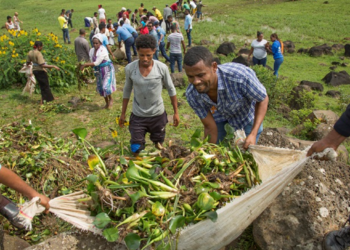Fishing and innovation at the center of Italian-Tunisian cooperation – The innovation of the Tunisian fish supply chain finds new vigor with Italian know-how and thanks to the cooperation between Mediterranean fish companies important innovations come in the exploitation of fisheries , with the promotion of new innovative, sustainable methods, and with the diffusion of new perspectives of aquaculture.
In fact, last December saw the emergence of an interesting cooperation in the fish sector in Tunisia, thanks to the Italian Agency for Development Cooperation which supported a new project aimed at improving production and consumption systems in view of a socio-economic and sustainable growth.
This project, which has made it possible to strengthen and improve the logistics and services of the Houmet Souk fish market in Djerba, was carried out by the International Center for Advanced Mediterranean Agronomic Studies – Ciheam Bari, in collaboration with the Ministry of Agriculture, Water Resources and Fishing, as part of the project called “Nemo Kantara” – Stabilization and Socio-Economic Development of the Tunisian Coastal Regions, financed by the Ministry of Foreign Affairs with a total budget of five million euros and for a duration of three years.
The inauguration ceremony was attended, among others, by the Governor of Medenine, Said Ben Zayed, the Italian Ambassador in Tunisia, Fabrizio Saggio, representatives of AICS – Italian Agency for Development Cooperation and the mayors of the communities operating in the fishing sector.
“The interventions financed by Italy, including the Nemo Kantara project, have a dual purpose: on the one hand, to improve the sustainability of production systems, creating more lasting wealth and employment; on the other hand, to ensure sufficient production based on food quality, while ensuring the balance of ecosystems and the conservation of biodiversity. This implies the urgency of building a new development paradigm in which the increase in production goes hand in hand with the rational use of natural resources and the tradition of fishing and aquaculture techniques meets modernization and innovation”, he repeated Fabrizio Saggio, Italian Ambassador in Tunisia.
The delegation led by the ambassador also visited some local start-ups that have received investment funds in the form of co-financing and donations. Furthermore, the planning resulting from the cooperation between Italy and Tunisia has found renewed vigor thanks also to the recent synergies triggered with the SUREFISH project, which saw the partners meet in Tunisia in October, in a general meeting at the Institut National des Sciences et Technologies de la Mer. The SUREFISH project sees 13 partners working together from both sides of the Mediterranean Sea (coming from Egypt, Italy, Lebanon, Spain and Tunisia), with the aim of spreading the importance of technology and ICT expertise , blockchain, labeling and intelligent packaging, implementing the importance of using innovative analytical and sensory methods for the traceability and evaluation of fisheries.
An entrepreneurial revolution for small-scale fishermen and fishing associations in Tunisia, with the intention of also developing new communication strategies in the Mediterranean related to fishing and the protection of fish fauna, to promote consumer confidence in fish, enhancing certification marks and applications for traceability and to share the big data that will be derived from the project. A case study for Tunisian consumers, which arose thanks to dissemination and information on the project, concerns an important fish product and at the same time the subject of considerable speculation: tilapia.
Thanks to the activity of Slow Food Tebourba and Gi.&Me. Association, chaired by the engineer Franz Martinelli, partner for Tunisia of the SUREFISH project, local consumers have acquired specific information on this fish product, which is low cost on the local market, as well as the most consumed in the territories of North Africa. This type of fish has also successfully established itself on European markets, thanks to its predominantly vegetarian diet, its remarkable speed of growth and its ability to live even in non-crystalline waters.
Fishing and innovation at the center of Italian-Tunisian cooperation









